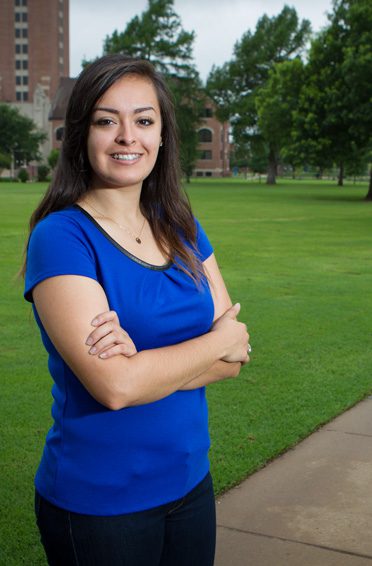
[dropcap]More[/dropcap] first-generation students are entering college. Unfortunately, almost as many end up packing their bags for home.
Recent reports estimate that between 20 and 30 percent (with other estimates even higher) of undergraduates today are first-generation students whose parents have never completed a four-year college degree. Up to 50 percent of these students come from low-income backgrounds, and they often are members of racial or ethnic minority groups.
Sound like a lot of statistics? Here’s the most sobering one: First-generation students drop out at nearly four times the rate of other students whose parents graduated college before them, with up to 90 percent of them never completing a degree.
Why do so many first-generation students fail to acclimate and thrive in a college environment? What obstacles do these students face that define their experiences differently from those of their peers?
According to Tulsa Community College freshman Rachael Surber, the challenges for first-generation students begin long before admission.
Surber recalls how stressful filling out the Free Application for Federal Student Aid – a task completed by most college hopefuls and their parents in an hour or so – was for her and her family.
“My parents and I were completely clueless and probably filled it out too many times,” Surber recalls. “It was an overwhelming beginning to a new experience.”
While both of Surber’s parents graduated high school, neither her mother nor her father had the opportunity to pursue a college career. Fortunately for Surber, this didn’t stop them from instilling a strong sense of priority in their daughter to achieve a higher education.
The same was true for recent Oklahoma City University graduate Liz Ramirez. Ramirez, who majored in Spanish and mass communications with emphasis in advertising and public relations, also comes from a family that provided unwavering emotional support to her throughout her college years. Ramirez’s parents, who emigrated from Mexico before she was born, never received a higher education. Her father was not able to attend school past the eighth grade. Her mother’s family lacked the resources to help her pursue an education past high school in Mexico, although she received her GED upon immigration to the United States. Ramirez says that despite being unable to achieve a college degree, her mother has served as a bedrock of encouragement.
“My mom has definitely been a great influence for me in my academic career,” she says. “She has challenged me to be better and do better, and I know she lives vicariously through me; my accomplishments are her accomplishments. She does her best to help me in everything and anything that she can. She wants to make sure she has done all she can for me to be able to go to college. It is because of her that I am such an academic person.”

Family Support Counts
Compared to many other first-generation students, Surber and Ramirez are lucky to have the support of their families. Many students who are the first in their family to attend college bear a burden of guilt for leaving home to pursue an education when family members often rely on them for emotional – and even financial – support. Leaving for college bearing this type of psychological weight ill-prepares these students for the anxieties that face them upon arriving, such as feelings of alienation, stigmatization by peers and confusion regarding where to seek help.
Surber remembers being both anxious and elated at the thought of attending college.
“Leading up to the beginning of college, I was so nervous about being the freshman again,” she says. “But as a first-generation college student, I was excited about being the first in my family to attend college! My hopes are that through this experience in life, I’ll take something away from it that will be helpful in my future and for the rest of my life, and open me up to new experiences.”
[pullquote]I promised my mom that one day I would be Dr. Ramirez, and I won’t stop until that promise is fulfilled.[/pullquote]“When beginning the process to go to college, I was very lost and scared,” Ramirez says, stating that the biggest challenge she faced was a lack of guidance about what to expect from the college experience.
“Many kids have their parents’ experiences to help them, but I lacked that portion. Thankfully, I went to a great high school, Harding Charter Preparatory High School, that prepared me adequately. I was prepared academically, and I had the help and support of the staff and faculty there,” says Ramirez. “My parents also stood by my side, and together, we figured it out. I had a whole team that helped get me to college.
“I was scared because I didn’t know much, and I didn’t exactly know what to expect, but I was excited. I love school, and I looked forward to the challenges that college held in store for me,” she continues. “I believe that I can do anything I set my mind to, and college was the next on the list. I had prepared myself well, and I had the support of many people; I believed I was set to succeed.”
Ramirez looks forward to beginning her MBA at OCU this fall.
“I promised my mom that one day I would be Dr. Ramirez, and I won’t stop until that promise is fulfilled,” she says.

First Experience
While the lack of inherited collegiate know-how has made the college experience for both Surber and Ramirez more challenging, their educational paths thus far have been all the richer for the obstacles. Both students say they are thankful for the opportunities and support they have received as first-generation students.
Surber credits the Tulsa Achieves program as instrumental in her being able to attend college. The program, which is available to all Tulsa County high school students with a grade-point average of 2.0 or higher, pays up to 63 hours, or three years of tuition and fees, for students who agree to start at Tulsa Community College the fall after their senior high school year.
“It has been beyond helpful to my parents and myself,” Surber says. “The Tulsa Achieves Program and the campus advisors have been great resources and very helpful to ensuring I have this opportunity.”
“I think an advantage to being a first-generation student is the amount of help that is available for us,” adds Ramirez. “People want us to go to college, so there are many resources that we can go to in order to make that happen. There are many programs and scholarships that help students like us obtain our degrees.”
Ramirez attended OCU as the recipient of the university’s Clara Luper Scholarship, a program for students who agree to enter as a full-time freshman at OCU the fall after they graduate high school and who demonstrate a financial need.[pullquote]Find a group of friends or a great advisor to help you along the way, and just enjoy it.[/pullquote]
“It’s a wonderful program that has allowed me to have such a fine education and has definitely helped me through my college journey,” she says. “There are also many scholarships specifically for first-generation students. Scholarships are the reason I was able to attend a private institution; without them, my family could not have been able to afford sending me to OCU.
“I think overall, my family, my former high school, Oklahoma City University and the Clara Luper Scholarship have been the greatest help in my journey,” Ramirez adds. “Between all of these I have formed a support group that has been cheering me on the entire time, being there to celebrate my victories and to cheer me up during the hard times. This support group is what has kept me going.”
A network of support is proving to be instrumental for first-generation students across the nation, not just in Oklahoma. At colleges across the United States, social groups and conferences for first-generation students are forming, enabling them to come together to share their experiences and earned wisdom.
After four years as a successful first-generation student, Ramirez plans to pursue a career in advertising or public relations that caters to the Hispanic community.
“It is okay to be lost, but it’s not okay to stay lost,” she advises other first-generation students. “It’s something new to us, but many people want to help; we just have to seek them out and ask. People want to see others succeed, so you just need to ask and someone will point you in the right way. Also, seek out other students, like myself, who have been through the process and have felt what you’re feeling now. I’m always happy to help others that are in a situation that I’ve been in previously.”
Surber wants other first-generation students to know that it’s easier than it seems.
“Anything is possible,” Surber says. “Find a group of friends or a great advisor to help you along the way, and just enjoy it.”






















